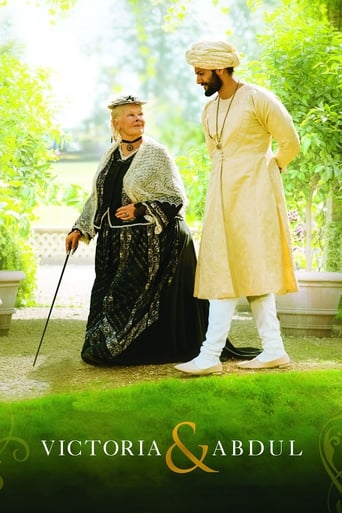dougiesantarosa
All while watching Victoria & Abdul "There but for the grace of the God." kept roaring through my brain. Glad to have never been a member of that bunch. A fine film very revealing too. When she has the Durbar Room built with elaborate carvings and a carpet from Agra, hanging portraits of Indians around the House, she tells the household she wants to give Abdul a knighthood. That starts Bertie, the Prime Minister, the court physician, Lady Churchill, et. al. to find a way to get rid of Abdul. They present Victoria with a dossier that shows he's ordinary and poor. When she asks the doctor to examine Abdul to find out why his wife hasn't become pregnant, he tells her that Abdul has gonorrhea hoping she'll get rid of Abdul to dismiss him in disgust. But, Victoria remains loyal to Abdul and tells her courtiers to stop plotting against Abdul. Bertie tries to certify Victoria as insane. Then Lady Churchill gets the household to tell Victoria if she doesn't get rid of Abdul, they'll resign. When she is told, she angrily summons the whole bunch of 'em and demands that if anyone wants to resign step forward. Of course, they all stand there with their thumbs up their asses, so she tells them Abdul is staying and instead of knighthood he'll be on her next list as a Commander of the Royal Victorian Order. As she ages and falls ill, she tries to get Abdul to go back to India because she knows what Bertie will do to him. She warns him that after she's gone, they'll turn on him. Abdul says he's not leaving. When she dies, Bertie takes charge as Edward VII. He burns all of the gifts and papers Abdul received from Victoria, sends him and his family back to India. It is revealed that Abdul lived in India until his death in 1909. By the way the scene where Abdul tells Victoria that the Indian "mutiny" (rebellion) in the 1850s was caused by resentment of the British behavior, including racist intolerance, Brit-style social rules, harsh land taxes, treatment of some rich landowners and princes - think South Africa apartheid and the horrific treatment of blacks in southern U.S. - it was accurate. Many Indians rose up against the British, but many others fought for the British, and the rest obeyed the British rules. So, when Victoria reminded the Prime Minister and Bertie what Abdul told her, she was correct and they were misinformed. There was exceptional cruelty inflicted on both sides. British officers and civilians (including women and children) inflicted intense beatings and killings on the rebels and their supporters (sometimes including entire villages) but the rebellion proved to bring an important change in Indian and British history leading to the end of East India Company in charge of India, and forcing the British to reorganize the army, the financial system, and the whole administration. In 1858 Victoria issued a proclamation. Even though lacking the authority of a constitutional provision, it promised rights similar to British subjects. In the following decades, when these rights were threatened again not always forthcoming, Indians pointedly referred to the her proclamation and a new nationalism.
SnoopyStyle
It's 1887 Agra, India. Abdul Karim (Ali Fazal) is a clerk in the local jail. Due to his height, he is picked to present Queen Victoria (Judi Dench) with a mohur for her Jubilee. He is eager for the prestigious opportunity although the other presenter is the much shorter and angry Mohammed. During the ceremony, Abdul makes forbidden eye contact with the Queen and she is taken with the tall dark stranger. She befriends him and makes him her Munshi which raises the concern of the court especially the heir Bertie, Prince of Wales (Eddie Izzard).The idea of the legendary Queen being taught by an Islamic scholar is profound history. This could be powerful with good tension and high drama. To achieve that, the movie has to hit precisely with Abdul. To me, he's played as too childlike. There is a way to do excitement without being childish. It diminishes his character which makes his lies more childlike. He needs nobility which is only partly there. Judi Dench is obviously a great actress and playing the Queen is well within her range. There is a powerful scene with her professing her loneliness. It would be more powerful if the tone isn't so light. Director Stephen Frears is trying to be too cute by half. The cutesy touches combine to lighten the much needed darker tension.
Paul Evans
The first thing anyone will say after watching this movie is how utterly amazing Judi Dench is, and rightly so, she ones again dons the robes of Queen Victoria and gives a commanding performance as one of the most famous monarchs. A performance worthy of an Oscar, she is an actress with unrivalled talent. This film is so much more then Dench's performance, spellbinding though it was.Ali Fazal, also worthy of accolades and awards, for his superb performance as Indian servant Abdul Karim. His performance is actually rather captivating, The Queen was taken under his spell and as a viewer so was I. Such an intriguing, fascinating character, probably unlike any other man she'd ever encountered.Superb production values throughout, the film was visually dazzling, sumptuous settings, jaw dropping costumes, this was a treat for the senses.A film is meant to move, and allow for escapism, when it can educate as well, it's worth of the elevated sore of 10/10.Absolutely loved it.









